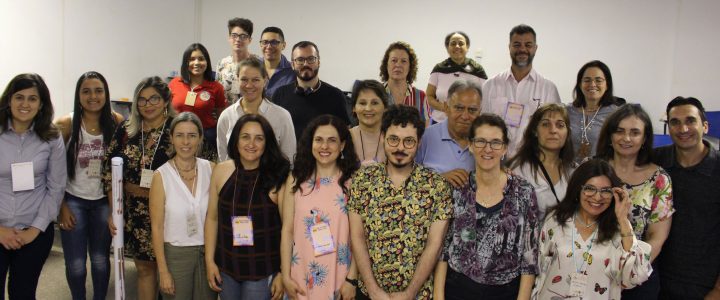On September 4, 2019, in the city of Cuiabá (Mato Grosso – Brazil), we held the third workshop about RCPol and its computational tools.
The Workshop took place together with the XV Brazilian Symposium on Paleobotany and Palinology where Dr. Cláudia Inês da Silva (RCPol coordinator) organized a section on Palinoecology that had speakers who participated in our Workshop.
Dr. Mercedes di Pasquo Lartigue (ALPP – CONICET / Argentina) started the workshop presentations by talking about her participation in the construction of RCPol tools, especially in the pteridophyte spore key and the future gymnosperm key.
MSc. Jefferson Nunes Radaeski (RCPol – ULBRA / Brazil) presented the history of the ULBRA Palinology Laboratory detailing the period between 2015 and 2019 and the forthcoming challenges of the laboratory in the near future.
Dr. Gonzalo Javier Marquez (CONICET / Argentina) spoke about spore surveys performed in the american southern cone and the most common morphological characteristics of the spores from this region.
Dr. Marcelo Araujo Carvalho (National Museum of Rio de Janeiro / Brazil) presented the history of the Museum and its fossil pollen collection. He also talked about the losses in the collection and the future of the collection after the 2018 fire in the museum.
MSc. Jefferson Nunes Radaeski (RCPol – ULBRA / Brazil) told us about the research focused on Rio Grande do Sul grass species and the analyzes that could be performed through the surveys made.
Dr. Teresa Dunia Isabel Ortuño Limarino (National Herbarium of Bolivia / Bolivia) presented in detail one of Bolivia’s research using Paleopalinology and the climate discoveries they made.
Dr. Regina Garcia (UNIOESTE / Brazil) spoke about honey production in western Paraná, the work with regional beekeepers and research related to the geographical indication of the area honey.
MSc. José Elton de Melo Nascimento (UEM / Brazil) presented about honey production in northeastern Brazil and the contributions of RCPol to the research in developed in the region.
Dr. Márcia Motta Maués (Embrapa Eastern Amazon / Brazil) spoke about ecosystem services and her research on the interaction between pollinators and Amazonian fruit plant species.
Dr. Patricia Maia Correia de Albuquerque (UFMA / Brazil) presented the history of the Palinoteca of the Federal University of Maranhão, the current situation and the prospects for the future.
Dr. Patrícia Nunes Silva (Unisinos / Brazil) spoke about the preliminary results of the research in partnership with RCPol carried out on pumpkin plantations to identify the plant species used by Peponapis pruinosa (bee specie that pollinates pumpkins) males and females.
Dr. Roberta Cornélio Ferreira Nocelli (UFSCar / Brazil) presented a research that uses pollen as a natural marker to evaluate plant-bee interaction in a regeneration area within an agricultural matrix.
Dr. Allan Koch Veiga (RCPol / Brazil) spoke about the process of building RCPol tools, the challenges and the next steps that can be developed.
Dr. Cláudia Inês da Silva presented a partial report on RCPol and opened the discussion for the group to talk about the continuity of RCPol after the completion of the BeeCare Bayer project.
On September 5th, there was the section on Palinoecology, organized and moderated by RCPol’s coordinator, Dr. Cláudia Inês da Silva, who opened the section presenting the contributions of RCPol to palynological studies.
Dr. Cristiane Krug (Embrapa Western Amazon / Brazil) spoke about the importance of palynology to identify the plants used by pollinators of Amazonian fruit species.
Dr. Isabel Alves dos Santos (USP / Brazil) presented some research using palynology to identify important plant species for the feeding of some bee species that could only be identified from the study of pollen grains.
Dr. Paula Andrea Sepulveda Cano (Universidad del Magdalena / Colombia) spoke about pollen studies at the University of Magdalena and prospects for the future.
Dr. Patricia Luiza de Oliveira Rebouças (UNIVASF / Brazil) presented the research carried out by the research group ECOMENTS with palynology and bees.

























You must be logged in to post a comment.